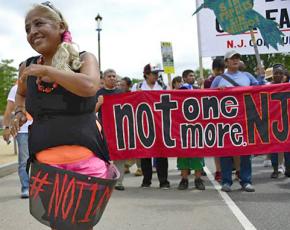Telling Obama Not1More
reports from Washington, D.C., on a rally to protest deportations.
SOME 500 people came out August 2 in Washington, D.C., to demand an end to deportations and attacks on immigrants. The rally was organized by #Not1More, a project of the National Day Laborer Organizing Network.
Although the movement against deportations has been building for years, this demonstration was especially important--thousands of refugee children from Central America are under threat of deportation. These minors left their home countries to escape violence and poverty, much of which can be traced back to U.S. military and economic policies, including the neoliberal Central American Free Trade Agreement (CAFTA), support for repressive regimes and the highly militarized "war on drugs."
The protesters came from across the U.S. After a rally on the National Mall, they embarked on a loud and spirited march through the streets of Washington, stopping briefly at the headquarters of Immigration and Customs Enforcement (ICE). The march ended at the White House, where it met up with as many as 15,000 people rallying to demand an end to Israel's attack on Gaza.

During the rally and march, protesters carried huge banners calling out the "deporter-in-chief" for carrying out 2 million deportations, and demanding that Obama take immediate executive action, including expanding the Deferred Action for Childhood Arrivals (DACA) program to cover anyone faced with deportation.
Among the groups that mobilized for the march was the Congreso de Jornaleros (Congress of Day Laborers) from New Orleans, which has organized the city's only day laborers' center, serving about 250 workers daily. Like many such centers, this one provides services and shelter to day laborers, many of whom are immigrants. But Congreso members see themselves as part of a larger struggle that includes the fight against deportations. According to Brayan Medina, "We're here so we can stop racism and stop separating families."
Reflecting a growing trend in the immigrant rights movement, there was also a large and visible presence of LGBTQ activists highlighting the connections between the two struggles and the specific issues facing LGBTQ immigrants, especially undocumented youth.
Salem Acuña, a Richmond, Va., organizer from the group Southerners on New Ground (SONG), commented on the importance and history of the role of LGBTQ immigrants within the movement: "There has been more and more visibility of undocumented LGBTQ folks within the #Not1More campaign. But for decades, LGBTQ activists have been key leaders in the immigrant rights movement. In the #Not1More campaign, the main leaders are queer women."
Another reflection of the effort to connect movements was a conscious attempt to link the immigrant rights and Palestine solidarity struggles. There was a representation of Palestine activists at the #Not1More rally, and a group of Washington, D.C., activists involved in both struggles worked to connect the two demonstrations taking place on August 2.
Maria Alejandra Salas described a plan to tie together the issues by having a Bike Ride for Liberation between the #Not1More rally and the later rally in solidarity with Gaza, saying, "We are for eradicating borders both here and in Gaza." Another organizer, Amrita Wassan, elaborated:
This is a really sinister moment. The government here is refusing to even give $3 billion to support the young people who are here under terrible conditions, yet there is unanimous support for money and arms for Israel. Why are young people coming to the U.S.? Because of U.S. military policies in Central America--military support of repressive governments. And this is also the root cause in Gaza. The deportations activists and Palestine activists will be sharing a stage--it's a group effort.
Both of the August 2 rallies were important parts of ongoing movements--and the connections being made between them make it clear that they are attacking from different angles, but fighting the same larger struggle.


